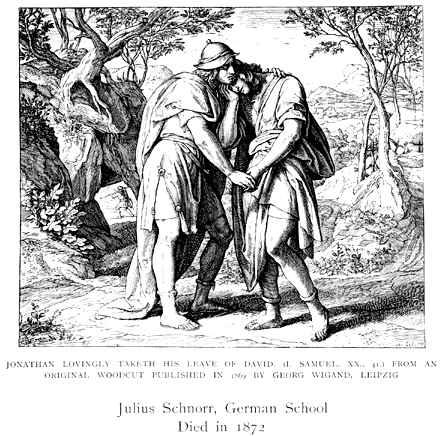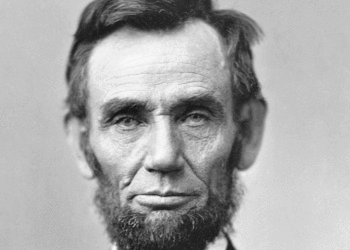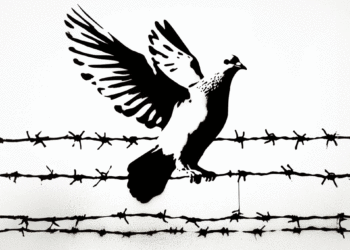Rabbis in Israel are reinterpreting Jewish law, and Orthodox gays are coming out of the closet
By MOSHE GIT
Two bombshells concerning the deeply shunned issue of homosexuality rocked the Orthodox community in Israel a month ago.
First, there was a declaration of 20 prominent Orthodox rabbis urging tolerance with regard to homosexuality. This move is unprecedented, since historically homosexuality has been shunned and considered an abomination, even punishable by death.
“Your love was wonderful to me more than the love of women” (2nd Samuel, 1:26). Some believe that Jonathan’s love for King David (shown above) was of a sexual nature.
Then, just a couple of days later, Israel’s media revealed that a most prominent and charismatic Israeli rabbi — who, but for his refusal, could have been the present chief rabbi of Israel — had been involved in homosexual acts (3-5-10 AJW). There also were suggestions that the present chief rabbi had been involved in homosexual acts; but those reports were brushed aside as unsubstantiated rumors. However, it now seems that there is substance to the accusations, for the rabbi was outed by other highly respected rabbis, after he reportedly admitted his acts to them.
(Editor’s note:Â To clarify, the entire substantiation sentence [the previous paragraph’s last sentence] relates to the rabbi addressed at the beginning of the paragraph, not the present chief rabbi.)
In recent decades, the attitude towards homosexuality has become more tolerant in the Western world; and the liberal streams of Judaism have joined this trend. But Orthodox Judaism stood fast in its condemnation — even the very mention of homosexuality was an anathema. Now, it appears that the winds are beginning to shift.
Perhaps what is bringing the change is the realization that homosexuality might not be a personal choice, and that much of society’s aversion to homosexuality is simply the result of homophobia. Indeed, it seems that Judaism has begun to examine whether prejudice may not have inflated its condemnation beyond what is warranted by scripture, for out of the entire gamut of homosexuality and homosexual acts, Torah forbids, per se, only the act of sodomy between males.
Perhaps the first person who brought the issue to the Orthodox (and Jewish, in general) public view was Steven Greenberg, an Orthodox rabbi, who had to struggle with the fact that he was a homosexual. In 1993, under an assumed name, he told the Jewish publication Tikkun about his torments and struggle, and that he was afraid to come out. The pseudonym he chose, “Yaakov Levado” (Jacob Alone), was very appropriate, for it expressed his feelings of loneliness and the struggle against superior powers he had to face.
The attitude in the Haredi (ultra-Orthodox) community towards homosexuality is still undaunted, but change there may come as well. While Haredim are strict about following halacha, they seem to be forgiving, and even accommodating after the fact. Incidents of homosexual acts in the Haredi community have become known, yet the community preferred to hush them up instead of making them public and harshly punishing the offenders.
A case in point is the story of Yaakov deHaan, a talented poet and author who, in 1919, immigrated to Palestine from Holland. He was a practicing homosexual who became ardently Orthodox and anti-Zionist. In one of his poems he expresses the feeling of being torn between his attraction to the Kadosh (holy) and to the Kadesh (a male prostitute). He exculpated himself from blame for his homosexual acts, arguing that the sin is God’s sin, not his, for such acts wouldn’t be sinful had God not made them so. Yet, despite deHaan’s pronounced homosexuality, the then ultra-Orthodox rabbi of Jerusalem, Rabbi Yosef Chaim Zonnenfeld, became close friends with him. DeHaan was assassinated in 1924 by pro-Zionists; but among Israeli Haredim he is revered to this day.
There were many issues in the past where rabbis adjusted, revised, created or abandoned rulings to have halacha come to terms with the developing understanding of reality. In a fairly recent case, top Israeli rabbis found it pointless to persist in their opposition to letting women vote. Even the entertainment of such a possibility now seems outlandish. Another example is the scheme, devised by rabbis, to practically void the explicit Torah prohibition on collecting interest on loans.
A number of different attempts to grapple with the issue of homosexuality within the framework of halacha (rabbinic law) have emerged. One argument invokes the (not universally agreed upon) halachic maxim that kavod habriot (the dignity of a human being) overrides prohibitions of the Torah, in tandem with the maxim that the wish of a human being is for dignity. According to this stance, a homosexual’s cravings constitute his dignity, and this overrides the Torah rule prohibiting the realization of those cravings.
A second approach uses the Talmud commentators’ explanation that Torah prohibited male sodomy since the act is done le’hachis, i.e. to show contempt or to be rebellious (to poke God in the eye) or to harm another person. The implication is that this act is not prohibited when it is done solely as an outlet to a craving (l’teavon). In our parlance, this would be saying that the prohibition against male sodomy is directed only towards “straights” but not towards “gays.”
Another heavy-duty issue that usually comes up in this context is the prohibition against spilling seed in vain. There are some halachic sources supporting the proposition that homosexuals aren’t under any halachic obligation to “be fruitful and multiply,” therefore they may waste their seed.
In his agony, Rabbi Greenberg approached Rabbi Yosef Eliashiv, the great Haredi sage, told him he was bisexual and asked for advice. Eliashiv responded: “[M]y friend, you have twice the power of love…”
If Rabbi Eliashiv considered homosexuality a blessing, on a par with heterosexuality, certainly, at the very least, it ought not to be condemned outright.
The latest press reports tell of a snowball effect: hundreds of Orthodox rabbis in Israel are joining the bandwagon, and many Orthodox gays there are coming out of the closet.
***
Moshe Git lives in Minnetonka.
(American Jewish World, 3.19.10)




















